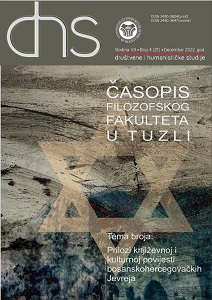NACIONALNI MESIJANIZAM U SLUŽBI SAMOUNIŠTENJA: STAVOVI MIROSLAVA KRLEŽE O NACIONALIZMU
NATIONAL MESSIANISM IN THE SERVICE OF SELF-DESTRUCTION: MIROSLAV KRLEŽA’S VIEWS ON NATIONALISM
Author(s): Senadin MusabegovićSubject(s): Cultural history, Political history, Social history, Croatian Literature, Nationalism Studies, Sociology of the arts, business, education, Interwar Period (1920 - 1939), WW II and following years (1940 - 1949), Post-War period (1950 - 1989), Theory of Literature, Identity of Collectives, Sociology of Literature
Published by: Filozofski fakultet Univerziteta u Tuzli
Keywords: Miroslav Krleža; nationalism; separatism; unitarism; Yugoslavia;
Summary/Abstract: The paper focuses on the divergent national perspectives – Croatian and Serbian – regarding the reasons behind Yugoslavia's unification (the Kingdom of SHS), moreover on the causes of its disappearance from the historical scene, both as the Kingdom of Serbs, Croats, and Slovenes and as the Socialist Federal Republic of Yugoslavia. From the perspective of Serbian „nationally conscious“ historians, it was the Croatian separatism that should be blamed for the downfall of the Kingdom of Yugoslavia during the Italian and German occupation in 1941 as well as the inner disintegration of the Socialist Federal Republic of Yugoslavia in 1991. From the Croatian perspective, the reason behind the downfall of Yugoslavia is in Serbian unitarism, which, through Yugoslavia, aimed to dominate over the other nations. While condemning the nationalistic politics of other nations for the breakup of Yugoslavia, both of these nationalistic perspectives consider Yugoslavia an artificial creation. Miroslav Krleža, a Croatian and Yugoslav writer, criticized the politics of Croatian national separatism and Serbian unitarism in the texts he wrote during the time of the Kingdom of SHS (Yugoslavia). These writings also represent his efforts to open a possibility for a new political community based on socialistic principles. Although his polemic thought was based on the recognition of national particularities, Krleža was looking for ways to overcome the national antagonisms within socialist Yugoslavia. Although Yugoslavia disappeared, his thought on nationalistic antagonisms is relevant in the current political framework, the one in which national exclusion is dominating.
Journal: DHS-Društvene i humanističke studije: časopis Filozofskog fakulteta u Tuzli
- Issue Year: XXI/2022
- Issue No: 21
- Page Range: 365-378
- Page Count: 14
- Language: Bosnian

